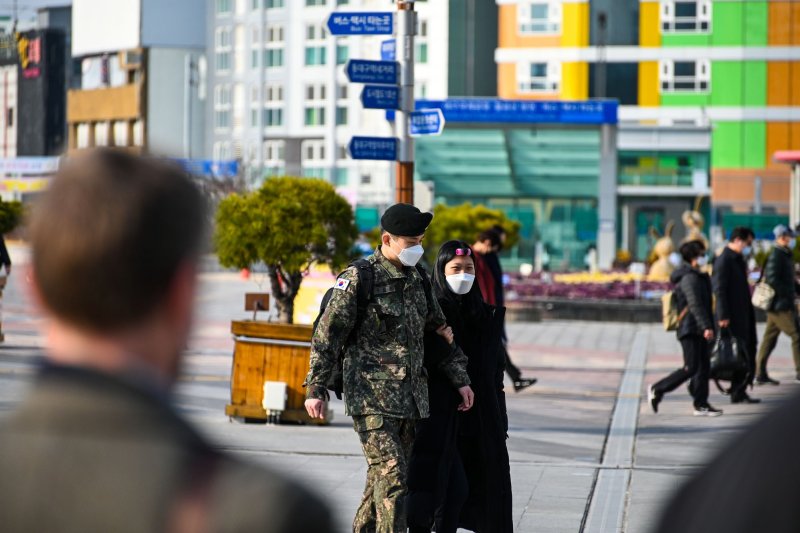South Korea's COVID-19 cases spiked on Wednesday to 1,261, with most patients traced to the southeastern city of Daegu. Photo by Thomas Maresca/UPI |
License Photo
SEOUL, Feb. 26 (UPI) -- As cases of the infectious COVID-19 disease in South Korea soared to 1,261 confirmed patients Wednesday, the government began testing over 200,000 members of the secretive Shincheonji Church of Jesus, the religious sect that has been at the center of the outbreak.
A total of 284 new cases were reported Wednesday, the highest single-day figure since the outbreak began, according to the Korea Centers for Disease Control and Prevention. The country's death toll increased to 12.
There had been only 51 reported cases a week ago. The spike is centered around Daegu, a southeastern city of 2.5 million people, and its neighboring North Gyeongsang Province.
Over half the total cases are connected to the Shincheonji church in Daegu, while another 10 percent are tied to a hospital in neighboring Cheongdo county, the KCDC said on Wednesday.
Authorities received a list of 212,000 Shincheonji followers from the church on Tuesday evening and will deliver it to local governments, Vice Health Minister Kim Gang-lip told reporters Wednesday at a briefing.
The government is expecting to complete coronavirus tests Wednesday on about 1,300 members of the 9,000 belonging to the Daegu church.
Kim warned of "stern" actions if the secretive group left some members off the list.
"[I]f the list is found to have missing members -- inadvertently or intentionally -- the government will take all available quarantine measures" against Shincheonji, he said, according to South Korean news agency Yonhap.
The outbreak around the church is connected to a 61-year-old woman, considered a "super-spreader" of the virus, who attended services before and after exhibiting symptoms.
Health officials advised the woman to be tested at least twice after coming down with symptoms, authorities said, but she refused until finally feeling sick enough to check into a clinic for the test on Feb. 17. She was confirmed as South Korea's 31st COVID-19 patient the next day.
A soldier with the United States Forces Korea stationed at Camp Carroll, about 12 miles from Daegu, tested positive for COVID-19, marking the first confirmed case for a U.S. service member, the USFK announced on Wednesday.
The patient, a 23-year old man, is in self-quarantine at off-base housing as the USFK remains at a "high" risk level peninsula-wide.
COVID-19 has also continued to spread to other areas around the country, with most major cities and provinces reporting cases. The number of patients in Busan, the country's second-largest city with a population of 3.5 million, rose to 58 on Wednesday, up from 43 the day before. Many of the patients have been connected to the Oncheon Christian church in the city's Dongnae district.
Seoul, the capital and country's largest city with a population of 9.8 million, saw its number of cases rise to 48, up from 40 a day earlier.
The number of people being checked for the virus and under quarantine rose to 20,716, the KCDC said Wednesday, and the country has tested a total of 52,292 suspected cases.
South Korean President Moon Jae-in Tuesday called for an urgent national response to the contain the virus, saying the government was launching an all-out support system, including military and police forces, as well as private medical personnel.
"What matters is timing and speed," he said. "We must achieve a clear turning point in the ever-increasing number of confirmed cases within this week."
The president said the government would expedite an additional budget, including special grants and reserve funds, to the afflicted areas to help alleviate the economic fallout from the outbreak.
The Moon administration has been facing criticism over its handling of the coronavirus outbreak, particularly as it has not banned all visitors from mainland China. South Korea has restricted entry to those from China's Hubei province, where the spread of the disease began.
A petition on the presidential Blue House website calling to ban entry for all mainland Chinese has received over 750,000 signatures.
Public backlash has also remained strong against the Shincheonji church, with an online petition demanding that the government forcibly dissolve the sect receiving almost 800,000 signatures by Wednesday evening.
The Daegu area was declared a "special management zone" last week, and the city's Mayor Kwon Young-jin urged all citizens to stay home if possible.
Around the country, people are being asked to work from home and avoid non-essential contact with others, while concerts, sporting events and other public gatherings continue to be canceled. Schools have extended the current holiday period by a week to March 9.
Fourteen countries, including Hong Kong and Israel, are banning entry for travelers from South Korea, while Singapore and Vietnam have placed an entry ban on those who have visited Daegu and Cheongdo. Another 11 countries have tightened screening and quarantine measures.
Several countries are also advising their citizens to avoid traveling to South Korea. The U.S. Centers for Disease Control and Prevention issued its highest travel warning on Monday, recommending that citizens avoid non-essential travel to South Korea.















